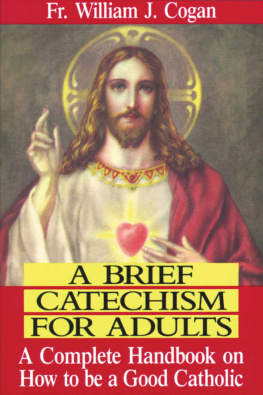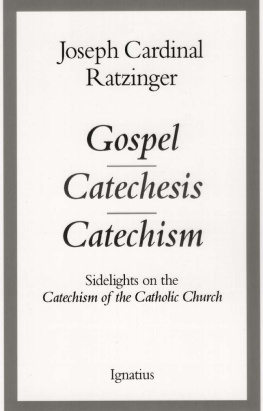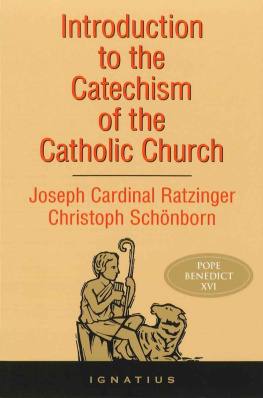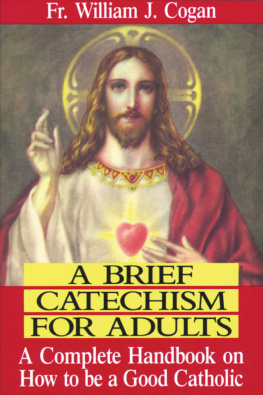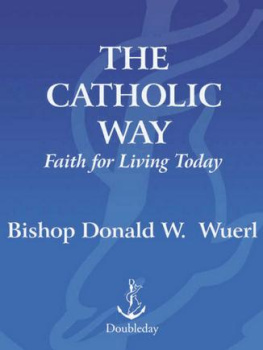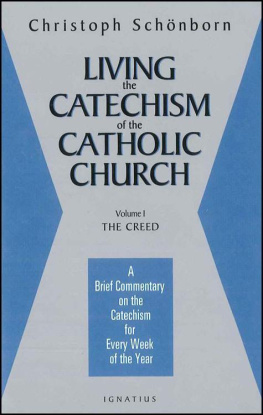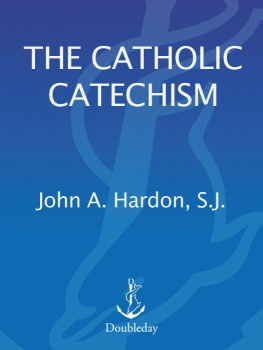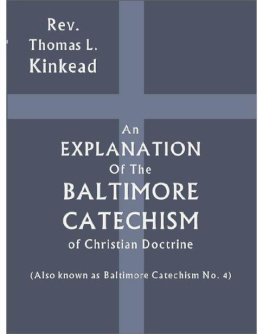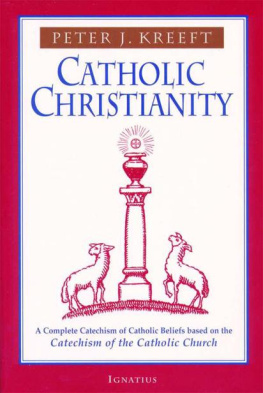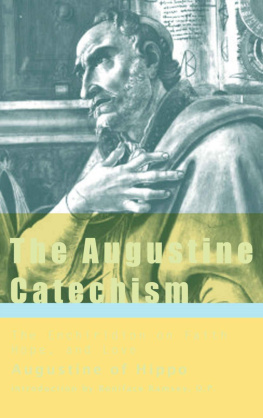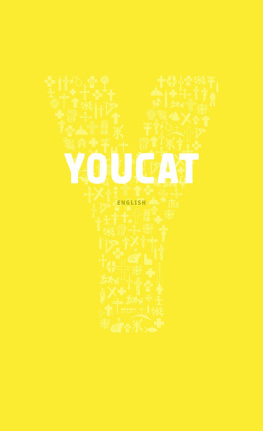A Brief Catechism For Adults
A Complete Handbook On How To Be A Good Catholic
Fr. William J. Cogan
Nihil Obstat: | Joseph Egan, S.J. |
| Imprimatur: | Samuel Cardinal Stritch
Archbishop of Chicago
May 25, 1958 |
Copyright 1958 by Rev. William J. Cogan. (The original edition copyright 1951 by Rev. William J. Cogan and published in November, 1951.)
New material copyright 1993 by TAN Books.
Published in 1958 under the title A Catechism for Adults by ACTA (Adult Catechetical Teaching Aids) Foundation, Chicago, a not-for-profit foundation under the supervision of the Archbishop of Chicago.
The type in this book is the property of TAN Books, and may not be reproduced, in whole or in part, without written permission from the Publisher.
Library of Congress Catalog Card No.: 93-60780
TAN Books
Charlotte, North Carolina
www.TANBooks.com
2014
"God, who at sundry times and in divers manners spoke in times past to the fathers by the prophets, last of all in these days hath spoken to us by his Son, whom he hath appointed heir of all things, by whom also he made the world ."
Hebrews 1:1
Contents
Author's Preface
This book is the work of many priests who actually instruct prospective converts from all walks of life. The original mimeographed edition was based on the series of instructions given by priests engaged in convert work for many years in the Archdiocese of Chicago. After being used experimentally for several inquiry classes, it was revised according to the suggestions of these priests. Since its first edition in 1951, it has become practically the standard catechism for instructing non-Catholics, not only in the United States and Canada, but wherever English is spoken. Priests from all over the world have sent their suggestions and comments for making the catechism even better. The author appreciates their help and hopes that they and the other priests who use this book will continue with their suggestions.
Special thanks are due Father Edward B. Brueggeman, S.J., S.T.D. and Father William A. Dowd, S.J., M.A., S.T.D., S.S.L. of St. Mary of the Lake Seminary; Father Edward Dufficy, M.A., S.T.B., of Quigley Seminary; Father George A. Herdegen, M.A., S.T.L., J.C.L. of the Matrimonial Tribunal of the Archdiocese of Chicago; Father Walter Imbiorski, M.A., S.T.L. of the Cana Conference; Father Elmer Wurth, M.M. of the Maryknoll Seminary in Glen Ellen, Illinois; Fathers Henry J. Pehler, M.A., S.T.L., Francis McGrath, M.A., S.T.B., Robert E. Burns, M.A., S.T.L. and Howard Tuite, M.A., S.T.L. parish priests of the Archdiocese of Chicago; all of whom worked very hard with the author in preparing this revision.
This edition, while following the time-tried, traditional approach to the Catholic religion, has incorporated what is good in newer techniques. The more abundant use of Holy Scripture, the "Practical Points" at the end of each lesson and the shorter answers will be welcomed by the priests who use this catechism.
This book aims at three things:
1st, Clearness in teaching religion so that the prospective convert can clearly know what he is supposed to believe and do in order to save his soul. The book is not meant to be a theological manual, but rather a handbook in which non-Catholics can find the main ideas given in the instructions.
2nd, Ordinary language. The book has been written in the language spoken by people of today. The use of theological terms and anglicized Latin words has been avoided as much as possible. Actual experience in giving the final examination to thousands of non-Catholics has helped the author to express theological concepts in the familiar words of everyday conversation.
3rd, Correct emphasis on the things necessary to form a Christian conscience. The book is designed to prepare its users for conversion, not to make theologians of them. Hence the author has tried to give the proper emphasis to sin, Heaven, Hell, prayer, the necessity of grace and the Sacraments. The special treatment of Marriage and family life is based on the conviction that most people will save their souls or lose them as married people, and that, therefore, they should clearly know their duties as married people and as parents.
It is hoped that this book will help priests in leading to the Master those who until now have had only a few crumbs that fell from His table.
Rev. William J. Cogan
1958
Introduction
For many people, God is some kind of vague Power who exists somewhere in outer space and who somehow created the world but who is not interested in the people who live on this planet. Nothing could be further from the truth. In studying these lessons, you will see how really interested God is in you and how much He loves you. The instructions which you will receive from the priest will make you more aware of God's love for you. You will also realize how much you have missed in life, and later on you will thank God for bringing you to take the instructions. This is, indeed, a demonstration of His great love for you.
Lesson 1: Religion
1. What is the purpose of these lessons? To fill in what is missing in the lives of so many peoplethe knowledge and practice of true religion. "The heart of the wise seeketh instruction: and the mouth of fools feedeth on foolishness ." (Proverbs 15:14). 2. Why is religion the most important study you can take up? Because God expects you to know what He has taught and what He wants you to do in this life. "Let no man deceive himself: if any man among you seem to be wise in this world, let him become a fool, that he may be wise. For the wisdom of this world is foolishness with God ." (1 Corinthians 3:18-19). 3. What is religion? Religion consists of two parts:1) Believing everything God has told the human race.2) Observing all your duties to God, yourself and your fellow men. "Be ye doers of the word, and not hearers only, deceiving your own selves ." (James 1:22). 4. Is religion really necessary? Yes, for several reasons1) God demands that every human being follow His plan of life.2) Without religion, life is meaningless.3) Lack of religion causes unhappiness, both in this life and in the next. "For he that rejecteth wisdom, and discipline, is unhappy: and their hope is vain, and their labours without fruit, and their works unprofitable. Their wives are foolish, and their children wicked ." (Wisdom 3:11-12). 5. What will happen to those who do not practice religion? They will be punished with the everlasting torments of Hell. "The Lord Jesus shall be revealed from heaven, with the angels of his power: in a flame of fire, giving vengeance to them who know not God, and who obey not the gospel of our Lord Jesus Christ ." (2 Thessalonians 1:7-8). 6. What will religion give you in this life? Peace of mind, which is greater than anything money can buy. "Blessed are they who hear the word of God, and keep it ." (Luke 11:28). "Much peace have they that love thy law, and to them there is no stumbling block ." (Psalm 118:165). 7. Are all religions the same? No, there is only one true religion, the one established by God Himself, which is explained in this book.
Lesson 2: The Bible and Tradition
"God, who at sundry times and in divers manners spoke in times past to the fathers by the prophets, last of all in these days hath spoken to us by his Son, whom he hath appointed heir of all things, by whom also he made the world ." (Hebrews 1:1).
1. What is the Bible? A collection of the writings which were inspired by God. "All scripture, inspired of God, is profitable to teach, to reprove, to correct, to instruct in justice, that the man of God may be perfect, furnished to every good work ." (2 Timothy 3:16-17). 2. What does "inspired by God" mean? It means that God chose some men and moved them to write down faithfully all the things, and only those things, which He wanted written down. "For prophecy came not by the will of man at any time: but the holy men of God spoke, inspired by the Holy Ghost ." (2 Peter 1:21). 3. Who, then, is the primary author of the Bible? God is, since He moved these men to write down the things He ordered, although He allowed them to write in their own language and style. "For I give you to understand, brethren, that the gospel which was preached by me is not according to man. For neither did I receive it of man, nor did I learn it; but by the revelation of Jesus Christ ." (Galatians 1:11-12). 4. How many writings, or books, are there in the Bible? There are 72. 5. When were all these writings put together? The Catholic Church put all of them into one book between the years 350 and 405. 6. How is the Bible divided? It is divided into two main parts, the Old Testament and the New Testament. The Old Testament contains the things God told the human race from the beginning of the world up to the coming of His Son, Jesus Christ. The New Testament contains what God has told us through His Son and through His Apostles and others . . Is it possible to misunderstand the Bible? Yes, even the Bible itself says so. "As also in all his [St. Paul's] epistles, speaking in them of these things; in which are certain things hard to be understood, which the unlearned and unstable wrest [twist], as they do also the other scriptures, to their own destruction ." (2 Peter 3:16). 8. How can you get the true meaning of the Bible? You can get it only from God's official interpreter, the Catholic Church. "Understanding this first, that no prophecy of scripture is made by private interpretation ." (2 Peter 1:20). 9. Is everything that God taught in the Bible? No, the rest is in Tradition. "Many other signs also did Jesus in the sight of his disciples, which are not written in this book ." (John 20:30). 10. What is Tradition? The Unwritten Word of God: these "other things Jesus did" were handed down by word of mouth by the Apostles and other close followers of Jesus. "Therefore, brethren, stand fast; and hold the traditions which you have learned, whether by word, or by our epistle ." (2 Thessalonians 2:14). 11. Do you have to believe in Tradition? Yes, because it is the Word of God and has equal authority with the Bible. The early Christians learned everything by Tradition, since only later on were some of the teachings of Jesus written down, the last writing being done at the end of the first century. That is, there was no New Testament in the early Church . 12. Are you free to believe whatever you want? No, you have to believe everything in the Bible and Traditionall the doctrines which the Catholic Church teaches. "The Lord Jesus shall be revealed from heaven, with the angels of his power: in a flame of fire, giving vengeance to them who know not God, and who obey not the gospel of our Lord Jesus Christ ." (2 Thessalonians 1:7-8). 13. What kind of sin is it to deny anything the Catholic Church teaches? Usually it is a serious sin, that is, a mortal sin. "Whosoever revolteth, and continueth not in the doctrine of Christ, hath not God. He that continueth in the doctrine, the same hath both the Father and the Son ." (2 John 1:9).
Next page
